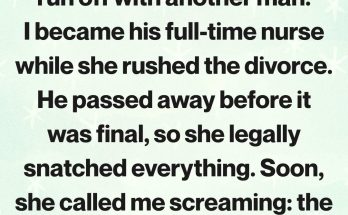
When I married Daniel, I knew his mother, Margaret, was strong-willed and protective. But I never expected her to cross one of the deepest lines a family can.

It started with little comments. She’d glance at our son Ethan, who had my dark curls instead of Daniel’s sandy hair, and murmur, “He doesn’t look much like a Thompson.” At first, I brushed it off, thinking it was insecurity or generational nitpicking. But over time, her remarks became sharper, and I could feel her suspicion growing like a shadow over our family.
The breaking point came one Sunday. Margaret came over with her usual basket of muffins, acting oddly cheerful. A week later, Daniel’s cousin accidentally let it slip—Margaret had taken Ethan’s hairbrush during that visit. She’d sent it off for a DNA test behind our backs. My heart dropped. The woman who rocked Ethan as a newborn, who called herself “Grandma,” had questioned whether he was even Daniel’s son.

When I confronted her, she burst into tears, insisting, “I just wanted to protect my son! I didn’t know if I could trust you.” She tried to spin it like she was the victim, claiming I was cruel for being angry. But the betrayal cut deep. Trust was shattered.
That night, I made the hardest decision: I told Margaret she was no longer welcome in our home. Daniel supported me—though he was torn up inside—because he knew the line she crossed wasn’t just about me. It was about Ethan’s dignity, our family’s privacy, and respect. Margaret still plays the martyr to relatives, saying I “stole her grandson.” But I know the truth: she broke the bond herself.
Sometimes protecting your family doesn’t mean keeping the peace—it means drawing boundaries, no matter how painful they are.


